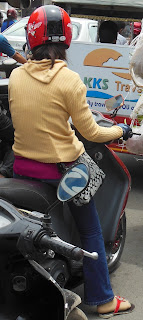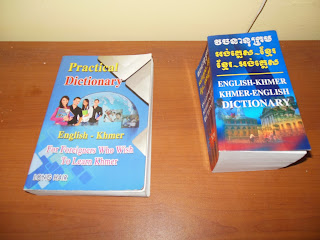“I hate
when people back home act like I’m a superhero,” my friend confides in me a few
years back. “I’m just a regular
person. My life here is different, but
it’s not necessarily harder than theirs.”
She
gestures to the fresh fruit smoothie she’s holding, the tasteful décor of the
café, the quietly humming air conditioner.
“I mean, look at this place. We
could be in my hometown right now.”
I
hesitantly nod agreement. But…
But what? My mind wanders to
experiences that haven’t been part of her three months here. Hot season.
Late-night bleary-eyed grading marathons. The Great Shrew Invasion of 2010. Incessant goodbyes. Maybe she’s still in the honeymoon phase. Surely life would be easier in America.
But… I’m not sure I can justify claiming hero status. How many of the “hardships” of my life are
any different than if I’d taken a job at a private school in Florida? How do these challenges stack up against Seasonal
Affective Disorder, or the standardized testing pressure of No Child Left
Behind, or foreclosures? What about the
perks I get here: $1 moto repairs; a house helper who cooks my dinners and
scrubs my toilet; a close-knit Christian community at school; free delivery
from dozens of tasty, cheap restaurants?
She’s right, I finally admit to myself. I guess I'm not a superhero. My life is not an epic tale of vanquishing
evil. But the truth is, part of me likes
the superhero reputation. Part of me
thinks that’s the reason I’m here.
The superhero image is dangerously
possible. Things that soon become
mundane here still sound mysterious to people who have never visited, and I’m
exposed to a lot of tough situations that (unlike some foreigners and many Cambodians) I don’t actually have to experience
firsthand. There are a half dozen
brothels on my way to the grocery store.
Freedom of speech doesn’t really exist for Cambodians. Nearly 1/3 of
Cambodians died during the genocide in the 1970s. I can toss out facts like those and make
Cambodia sound like this wasteland that only my extraordinary courage and
strength have enabled me to survive. “Wow, I could never do that,” some people say. “You are so brave.” Though I try to seem humble, I kind of love
hearing that.
Yet in many ways, Phnom Penh is a
pretty cushy city for foreigners. Take
the foreign foods available here: besides my favorite French treats, I can buy
ultra-American foods like Betty Crocker cake mixes, canned cranberry jelly, and
Old El Paso salsa less than a mile from home.
You’d have to hunt high and low for those in most of Europe. My classroom has great air conditioning,
wifi, and (since January) even its own LCD projector. Rent is a fraction of the American
rates. I’ve vacationed in four other
countries with savings from my "meager" salary.
Most days, my life looks kind of
like this: wake up, go to school, come
home, eat, work, go to bed. Most
days, I don’t speak that much Khmer. I
don’t stand up for the victims of trafficking or land-grabbing. I don’t talk with the many poor people I
drive past, or even with my next-door neighbors. I live in this artificial bubble where it’s
not weird to eat yogurt for breakfast, where people think $8 (not $1) is a
great price for a haircut, where people get my sarcasm. In many ways, my life hasn't changed that
much from when I lived in America.
That can be painful to admit. I’m a missionary. Aren't they supposed to be extreme? In high school, I thought my address overseas
would be “The Front Lines,” not “Near the Prime Minister’s Nephew.” If I assume my life is harder and more heroic
than in the US, then I feel like I’ve earned the right to complain about
certain aspects of it. I can hold onto
my pride and my sense of superiority.
But the more I talk with people who (unlike me) have done adult life in
the US, the less I’m able to justify this way of thinking. Isn’t the grass always greener, and doesn’t
everyone have hidden struggles? In fact, while I know some foreigners who face monumental challenges here, a few friends even say coming to Cambodia was a relief compared to the load they carried in the US. My life
is different than it would be in America, sure, but “difficult” comes in all
shapes and sizes. So maybe I haven’t
earned any special right or status.
That's why I was a bit apprehensive
when my parents, and later my sister, came to visit. What would they think of my house here, where
my four roommates and I share as much floor space as my childhood home? Would they judge me for how often I eat
out?
As it turns out, they were
awesomely supportive as usual, and they didn’t criticize my choices. But sure enough, when I asked my sister what
had surprised her during her time here, she replied, “Your life seems kind of
normal.” Maybe I’m just a person. Maybe I need a Superhero far more than anyone needs me.
I’m glad my family has the inside
scoop. I’m glad they know to take my
whining with a grain of salt. And so I
want to let you blog readers in as well, as a safeguard against my urge to
impress you and feign invulnerability.
Ready?
I am not a superhero.
I am an ordinary twenty-something getting used to life after college. Yes, life in Cambodia features a different set of challenges. Sometimes I brag about those challenges. Sometimes I feel defeated by them. But sometimes, just sometimes, I realize they're all tangled up with the amazing blessings that make up a life I'll never deserve.
I am not a superhero.
I am an ordinary twenty-something getting used to life after college. Yes, life in Cambodia features a different set of challenges. Sometimes I brag about those challenges. Sometimes I feel defeated by them. But sometimes, just sometimes, I realize they're all tangled up with the amazing blessings that make up a life I'll never deserve.























